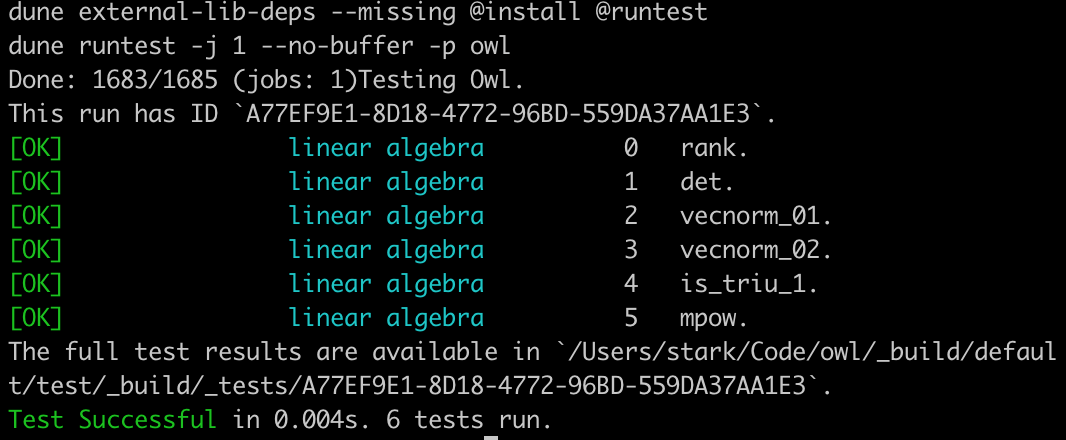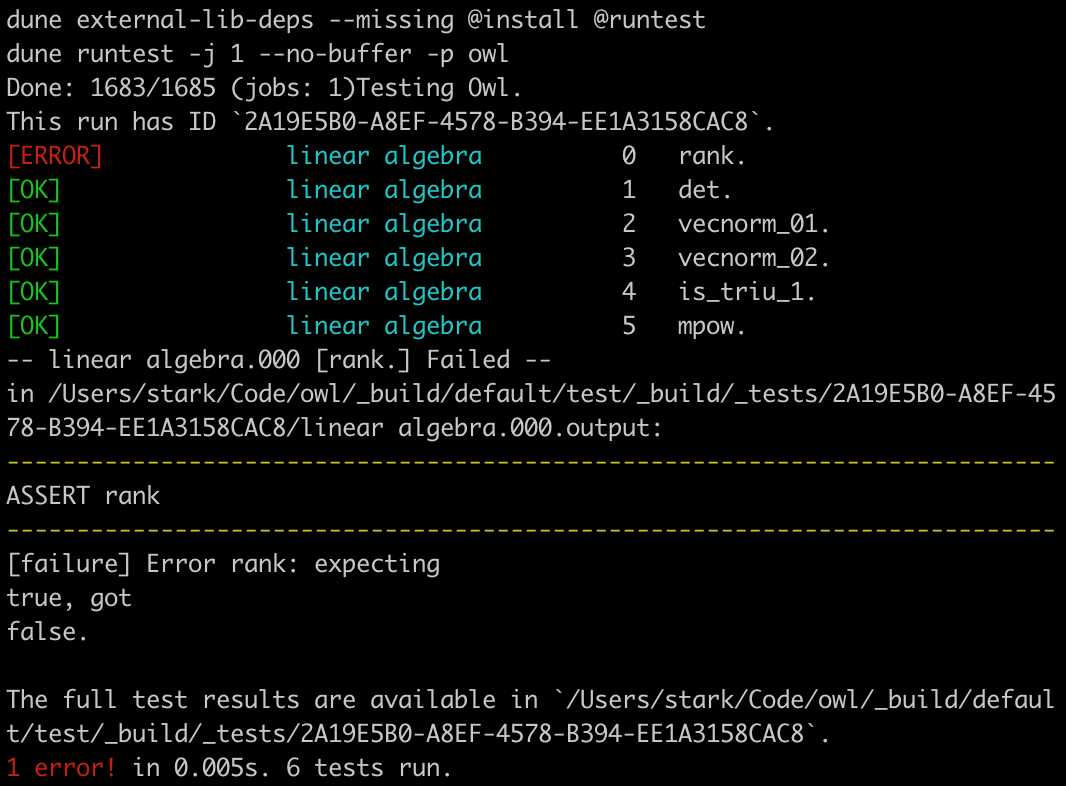Testing Framework
Every proper software requires testing, and so is Owl. All too often we have found that testing can help use to find potential errors we had not anticipated during coding. In this chapter, we introduce the philosophy of testing in Owl, the tool we use for conducting the unit test, and examples to demonstrate how to do that in Owl. Issues such as using functors in test, and other things to notice in writing test code for Owl etc. are also discussed in this chapter.
Unit Test
There are multiple ways to perform tests on your code. One common way is to use assertion or catching/raising errors in the code. These kinds of tests are useful, but embedded in the code itself, while we need separate test modules that check the implementation of functions against expected behaviours.
In Owl, we apply unit test to make sure the correctness of numerical routines as much as possible. Unit test is a software test method that checks the behaviour of individual units in the code. In our case the “unit” often means a single numerical function.
There is an approach of software development that is called Test Driven Development, where you write test code even before you implement the function to be tested itself.
Though we don’t enforce such approach, there are certain testing principles we follow during the development of Owl.
For example, we generally don’t trust code that is not tested, so in a PR it is always a good practice to accompany your implementation with unit test in the test/ directory in the source code.
Besides, try to keep the function short and simple, so that a test case can focus on a certain aspect.
We use the alcotest framework for testing in Owl. alcotest is a lightweight test framework with simple interfaces. It exposes a simple TESTABLE module type, a check function to assert test predicates and a run function to perform a list of unit -> unit test callbacks.
Example
Let’s look at an example of using alcotest in Owl. Suppose you have implemented some functions in the linear algebra module, including the functions such as rank, determinant, inversion, etc., and try to test if before make a PR.
The testing code should look something like this:
open Owl
open Alcotest
module M = Owl.Linalg.D
(* Section #1 *)
let approx_equal a b =
let eps = 1e-6 in
Stdlib.(abs_float (a -. b) < eps)
let x0 = Mat.sequential ~a:1. 1 6
(* Section #2 *)
module To_test = struct
let rank () =
let x = Mat.sequential 4 4 in
M.rank x = 2
let det () =
let x = Mat.hadamard 4 in
M.det x = 16.
let vecnorm_01 () =
let a = M.vecnorm ~p:1. x0 in
approx_equal a 21.
let vecnorm_02 () =
let a = M.vecnorm ~p:2. x0 in
approx_equal a 9.539392014169456
let is_triu_1 () =
let x = Mat.of_array [| 1.; 2.; 3.; 0.; 5.; 6.; 0.; 0.; 9. |] 3 3 in
M.is_triu x = true
let mpow () =
let x = Mat.uniform 4 4 in
let y = M.mpow x 3. in
let z = Mat.(dot x (dot x x)) in
approx_equal Mat.(y - z |> sum') 0.
end
(* Section #3 *)
let rank () = Alcotest.(check bool) "rank" true (To_test.rank ())
let det () = Alcotest.(check bool) "det" true (To_test.det ())
let vecnorm_01 () = Alcotest.(check bool) "vecnorm_01" true (To_test.vecnorm_01 ())
let vecnorm_02 () = Alcotest.(check bool) "vecnorm_02" true (To_test.vecnorm_02 ())
let is_triu_1 () = Alcotest.(check bool) "is_triu_1" true (To_test.is_triu_1 ())
let mpow () = Alcotest.(check bool) "mpow" true (To_test.mpow ())
(* Section #4 *)
let test_set =
[ "rank", `Slow, rank
; "det", `Slow, det
; "vecnorm_01", `Slow, vecnorm_01
; "vecnorm_02", `Slow, vecnorm_02
; "is_triu_1", `Slow, is_triu_1
; "mpow", `Slow, mpow ]
There are generally four sections in a test file.
In the first section, you specify the required precision and some predefined input data.
Here we use 1e-6 as precision threshold. Two ndarrays are deemed the same if the sum of their difference is less than 1e-6, as shown in mpow.
The predefined input data can also be defined in each test case, as in is_triu_1.
In the second section, a test module that contains a series of test functions needs to be built.
The most common test function used in Owl has the type unit -> bool.
The idea is that each test function compares a certain aspect of a function with expected results.
If there are multiple test cases for the same function, such the case in vecnorm, we tend to build different test cases instead of using one large test function to include all the cases.
The common pattern of these functions can be summarised as:
let test_func () =
let expected = expected_value in
let result = func args in
assert (expected = result)
It is important to understand that the equal sign does not necessarily mean the two values have to be the same; in fact, if the float-point number is involved, which is quite often the case, we only need the two values to be approximately equal enough. If that’s the case, you need to pay attention to which precision you are using: double or float. The same threshold might be enough for single precision float number, but could still be a large error for double precision computation.
In the third section wraps these functions with alcotest by stating the expected output. Here we expect all the test functions to return true, though alcotest does support testing returning a lot of other types such as string, int, etc. Please refer to the source file for more detail.
In the final section, we take functions from section 3 and put them into a list of test set. The test set specifies the name and mode of the test.
The test mode is either Quick or Slow.
Quick tests run on any invocations of the test suite.
Slow tests are for stress tests that run only on occasion, typically before a release or after a major change.
After this step, the whole file is named unit_linalg.ml and put under the test/ directory, as with all other unit test files.
Now the only thing left is to add it in the test_runner.ml:
let () =
Alcotest.run "Owl"
[ "linear algebra", Unit_linalg.test_set;
...
]
That’s all. Now you can try make test and check if the functions are implemented well:

What if one of the test functions does not pass? Let’s intentionally make a wrong test, such as asserting the matrix in the rank test is 1 instead of the correct answer 2, and run the test again:

What Could Go Wrong
Who’s watching the watchers?
Beware that the test code itself is still code, and thus can also be wrong. We need to be careful in implementing the testing code. There are certain cases that you may want to check.
Corner Cases
Corner cases involve situations that occur outside of normal operating parameters.
That is obvious in the testing of convolution operations.
As the core operation in deep neural networks, convolution is complex: it contains input, kernel, strides, padding, etc. as parameters.
Therefore, special cases such as 1x1 kernel, strides of different height and width etc. are tested in various combinations, sometimes with different input data.
module To_test_conv2d_back_input = struct
(* conv2D1x1Kernel *)
let fun00 () = ...
(* conv2D1x2KernelStride3Width5 *)
let fun01 () = ...
(* conv2D1x2KernelStride3Width6 *)
let fun02 () = ...
(* conv2D1x2KernelStride3Width7 *)
let fun03 () = ...
(* conv2D2x2KernelC1Same *)
let fun04 () = ...
...
(* conv2D2x2KernelStride2Same *)
let fun09 () = ...
Test Coverage
Another issue is the test coverage. It means the percentage of code for which an associated test has existed.
Though we don’t seek a strict 100% coverage for now, wider test coverage is always a good idea.
For example, in our implementation of the repeat operation, depending on whether the given axes contains one or multiple integers, the implementation changes. Therefore in the test functions it is crucial to cover both cases.
Use Functor
Note that you can still benefit from all the powerful features OCaml such as functor. For example, in testing the convolution operation, we hope to the implementation of both that in the core library (which implemented in C), and that in the base library (in pure OCaml). Apparently there is no need to write the same unit test code twice for these two set of implementation.
To solve that problem, we have a test file unit_conv2d_genericl.ml that has a large module that contains all the previous four sections:
module Make (N : Ndarray_Algodiff with type elt = float) = struct
(* Section #1 - #4 *)
...
end
And in the specific testing file for core implementation unit_conv2d.ml, it simply contains one line of code:
include Unit_conv2d_generic.Make (Owl_algodiff_primal_ops.S)
Or in the test file for base library unit_base_conv2d.ml:
include Unit_conv2d_generic.Make (Owl_base_algodiff_primal_ops.S)
Summary
In this chapter we briefly introduce how the unit tests are performed with the alcotest framework in the existing Owl code base.
We use one example piece of test code for the linear algebra module in Owl to demonstrate the general structure of the Owl test code.
We then discuss some tips we find helpful in writing tests, such as considering corner cases, test coverage, and using functors to simplify the test code.
In practice, we find the unit tests come really handy in development, and we just cannot have too much of them.